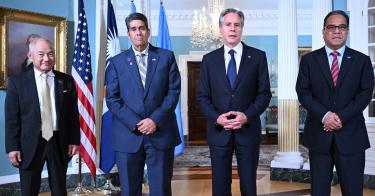With the clock ticking toward a Sept. 30 deadline, the U.S. is racing to preserve strategic national security interests in the Pacific that it could lose to China if Congress doesn’t act soon.
The impending expiration of long-time agreements with two Pacific Islands nations presents not just a threat to American national security, but a golden opportunity for the Chinese Communist Party to broaden its sphere of influence in a region critically important to the U.S.
The Compact of Free Association pacts are unique 20-year agreements that govern U.S. relations with three Pacific Islands nations: the Marshall Islands, Palau, and Micronesia.
In exchange for economic assistance and access to American federal programs and services, the three countries grant the U.S. exclusive rights and authorities to set up American defenses on the islands. The U.S. can station military personnel there and prohibit other nations’ militaries from entering the three countries’ territorial waters.
The key economic provisions of the expiring agreements with Micronesia and the Marshall Islands include developmental and financial assistance, including grants for their educational, health, and infrastructure sectors.
Palau’s agreement does not expire until September 2024, but the nation has already signed a new compact and wants to renew it alongside Micronesia and the Marshall Islands this year. The final terms of the Marshall Islands agreement are still being negotiated. The main dispute for that agreement revolves around nuclear testing provisions.
The Biden administration has proposed spending $6.5 billion over 20 years for the three compacts. Another $600 million was requested to fund U.S. Postal Service operations on the islands, bringing the total proposal to $7.1 billion or, on average, a little over $100 million per country annually. Such money would be well spent to secure American strategic interests in the Pacific.
With no final agreement between the U.S. and the Marshall Islands ready for Congress to consider, however, it is looking increasingly likely that the compacts will not be renewed and fully funded by the Sept. 30 deadline. This failure would offer significant opportunities for China and serious consequences for the U.S. and its allies.
If U.S. funding for its compact partners is cut off, Beijing can be expected to swoop in with offers of economic assistance and closer diplomatic ties, threatening America’s privileged position in this vital corner of the Pacific. As China has previously demonstrated in the region with the Solomon Islands, economic assistance has many strings attached that favor the Chinese Communist Party’s ambitions, including expanded military cooperation.
In a recent letter to the chairmen and ranking members on key congressional committees related to the compacts, Rep. Amata Radewagen, R-American Samoa, noted that past funding uncertainty for the compacts “created instability which [China] exploited through ruthless political warfare and economic coercion.”
The failure to renew the compacts will also bring economic and social consequences for Micronesia and the Marshall Islands. Both governments rely on compact funding for a significant portion of their national budgets. Families are at risk of losing paychecks and government services, such as those used to support the financial and aviation sectors, will be restricted.
However, this assistance should not be mistaken for charity. Rather, it should be seen as an investment by the American taxpayer that will result in key national security assets.
It remains up to Congress to renew and fund the agreements. The State Department also needs to conclude negotiations with the Marshall Islands for Congress’ consideration. Both should be done as soon as possible before China takes advantage of a potential strategic vacuum.
As negotiations continue, the House has included $1 billion for the compacts in the State, Foreign Operations, and Related Programs appropriations act, a bill that makes unprecedented trade-offs to prioritize the Indo-Pacific. Although the bill has not passed the House yet, the inclusion signals a strong U.S. commitment to the compacts even at a time when conservatives are rightly demanding spending cuts in the bill.
A significant amount of hard work has gone into renewing the agreements, but now, time is running out. As Congress debates funding the U.S. government for the next year, it should not forget the importance and urgency of renewing and funding the compacts.
In the words of Radewagen, “For America and the Pacific, Congress needs to get COFA renewal right this time.”
This piece originally appeared in The Daily Signal




